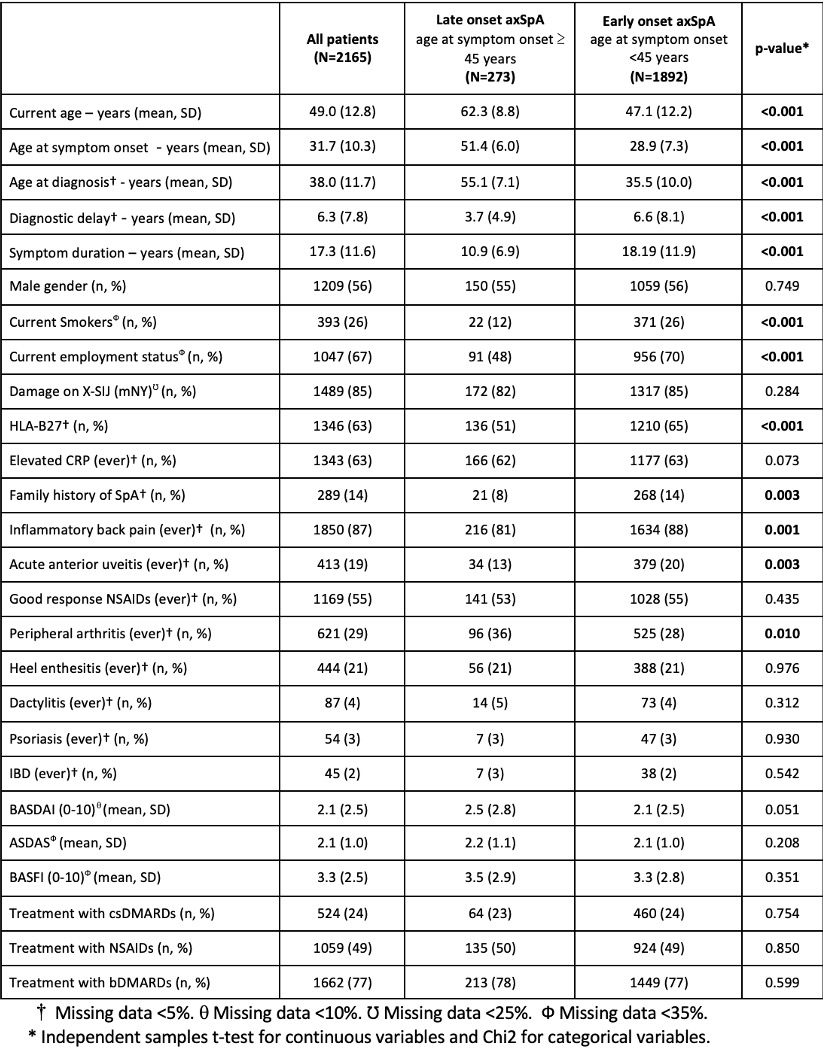Session Information
Session Type: Poster Session C
Session Time: 9:00AM-11:00AM
Background/Purpose: Axial spondyloarthritis (axSpA) typically starts before the fourth decade of life. Consistent with that, the Assessment of SpondyloArthritis international Society (ASAS) classification criteria for axSpA should be applied only in patients with chronic back pain starting before 45 years of age. It has, however, been suggested that axSpA can sometimes start later in life with a distinctive phenotype, the so-called ‘late onset axSpA’ (lo-axSpA). There is, nevertheless, only limited data in support of the existence of such phenotype. We aimed to evaluate the occurrence of lo-axSpA and if these patients differ from those with early onset axSpA (eo-axSpA).
Methods: We performed a cross-sectional, multicentre, nationwide study using data from Reuma.pt, the Portuguese registry of patients with rheumatic diseases. Adult patients with the clinical diagnosis of axSpA, according to their treating rheumatologist, and with available information on the age of symptom onset were included. Lo-axSpA was defined as axSpA with a symptom onset ≥ 45 years of age. Demographic characteristics (e.g., age, gender, smoking status, and employment), SpA features [12 features (see Table) recorded as ever present, i.e., any time in the past or at the current study visit], measures of disease activity (ASDAS and BASDAI), disability (BASFI) and treatment with NSAIDs, csDMARDs and bDMARDs were compared between patients with lo-axSpA and eo-axSpA at the last available visit at the time of data extraction (13/12/2022).
Results: In total, 2165 patients with axSpA were included. The mean (standard deviation; SD) age at symptom onset was 32 (10) years and the mean (SD) symptom duration was 17 (12) years. The majority of the patients were male (56%), most had definite damage on pelvic radiographs according to the modified New York criteria (85%) and were treated with bDMARDs (77%). Out of the total 2165 patients, 273 (13%) had symptom onset ≥ 45 years and were therefore labelled as lo-axSpA. There were no differences in disease activity, disability or treatment between patients with lo-axSpA and eo-axSpA (Table). There were, however, some notable differences between the two groups. Patients with lo-axSpA were less often positive for HLA-B27 (51% vs 65%), less likely to have family history of SpA (8% vs 14%), acute anterior uveitis (13% vs 20%) and inflammatory back pain (81% vs 88%) than patients with eo-axSpA. On the contrary, patients with lo-axSpA had more peripheral arthritis (36% vs 28%) than patients with eo-axSpA.
Conclusion: This study shows that axSpA indeed starts before 45 years of age in the vast majority of the patients. Even though recall bias cannot be entirely ruled out, clinicians should however be aware that late-onset disease, though infrequent, may in some cases exist. This minority phenotype has a weaker association with HLA-B27, a lower probability of family history, inflammatory back pain or uveitis but more peripheral involvement.
To cite this abstract in AMA style:
Lucas Rocha M, Torres R, Ramiro S, Morais Castro A, Neves A, Martins A, Teodósio Chícharo A, Mendes B, Ochôa Matos C, Soares C, Miguel C, Pinto Oliveira C, Parente H, A. Melo Gomes J, Luís M, Santos M, Couto M, Bernardes M, Valente P, Costa R, Sousa S, Branco J, Pimentel-Santos F, Sepriano A. Prevalence and Clinical Characteristics of Late Onset Axial Spondyloarthritis: Results from a Multicentre Nationwide Study [abstract]. Arthritis Rheumatol. 2023; 75 (suppl 9). https://acrabstracts.org/abstract/prevalence-and-clinical-characteristics-of-late-onset-axial-spondyloarthritis-results-from-a-multicentre-nationwide-study/. Accessed .« Back to ACR Convergence 2023
ACR Meeting Abstracts - https://acrabstracts.org/abstract/prevalence-and-clinical-characteristics-of-late-onset-axial-spondyloarthritis-results-from-a-multicentre-nationwide-study/

